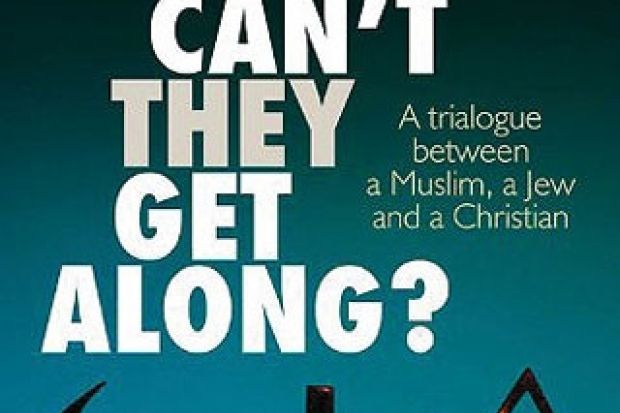Why Can't They Get Along? A Conversation Between a Muslim, a Jew and a Christian
By Dawoud El-Alami, Dan Cohn-Sherbok, George D. Chryssides
ISBN: 074595605X
Price: £9.99 (Amazon UK)
My wife have often scolded me for referring to some theological texts as objectively 'bad,' stating that my opinion on the book is not authoritative and simply an opinion. However, having now read this book I can say that there are some books which are objectively bad and this is one of them.
I picked up 'Why Can't They get Along?' a few weeks ago whilst away at a conference to give me something interesting to read on the train home. The premise of the book was an interesting one, with respected thinkers from the three Abrahamic Faiths giving overviews of their community's positions on certain areas of contention and then having a civilised discussion of the issue. Though ultimately doomed to produce agreement (since acceptance of something contrary is arguably rejection of the others) I felt was it as an interesting book to help me understand how to discuss matters with friends of other faiths and the book certainly makes for an interesting read on Islamic and Jewish approaches to matters of faith.
The text itself is split into four parts which are labelled Teachings, Practices, Ethics and Societal Issues. These themselves are split into four chapters on specifics which are discussed by the three authors. The structure of the writing is that it is introduced by one author from his community and then the other will state theirs, which then leads to the three each having an opportunity to comment on the issues raised. This makes a fair discussion between the authors and allows for them to touch on the issues as well as introducing their position with adequate space.
The discussion concept is however the biggest issue with the book, and there are many issues to discuss. Firstly, the concept of a text designed to allow some form of interfaith dialogue does not work in the way it intended. The book often seems to collapse into off topic attacks on one or two of the authors. This tends to start from an offhand comment by an author, for example bringing the Palestine conflict up when discussing the nature of God, to try and score cheap kicks. Considering that the book is supposed to be an academic text, this is disappointing.
As well as this, the caliber of the Christian discussion is quite simply dire. Having met both Dawoud El-Alami and Dan Cohn-Sherbok whilst studying is South Wales I know them to be reputable scholars of their respected faiths, something they demonstrate in the book by giving faith acknowledgement of the varying positions taken on matters. George Chryssides, on the other hand, does a poor job of representing Christianity and comes off as an extremely liberal and somewhat theologically inept clergyman.
Two examples of this are him being corrected in his Trinitarian Theology when he suggested that the sabellian approach to the trinity is the correct one, amusingly leading to Dan Cohn-Sherbok explaining that Sabellius was anathematised, and also his suggestion that very few Christians see anything in the Bible (including the virgin birth) as more than mythological devices with little regard to the doctrinal positions of communities such as the Orthodox Church or even that of the Creed, in which it is made clear that it is anathema to oppose that Christ was born of a Virgin. Both of these demonstrate either an unbearably liberal approach to the faith (where doctrinal positions are non-existent) or a very poor understanding of these matters and make the book almost unreadable to anyone who takes the Christian faith serious.
On a positive note, the book gives some amazing insight into the life and faith of Islam and Judaism and the conflicts that exist within these communities on matters of belief and practice. Put simply, the book would be marvellous if it were called 'Why Can't They Get Along? A Conversation Between a Muslim and a Jew' and the Christianity section was simply cut out. Both Dawoud El-Alami and Dan Cohn-Sherbok equally sell the premise of the book and do not pull punches when getting into controversial topics such as views on historical genocides, apostasy and the Israel-Palestine conflict.
For the reasons covered above, I would sadly not recommend this book to anyone unless they simply wanted to know more about Judaism and Islam. As someone that enjoys Theological texts (and reviewing them) I almost refused to finish this book due to the awfully misrepresented character and theology of Christianity portrayed in the book. I would go as far as to recommend it be renamed ‘Why Can't They Get Along? A Muslim and a Jew demonstrate why Christians need to learn Theology before they open their mouths about it. ’ Because of this, I found the book dishonest and lacking in any theological discussion of value to the Christian so there is no way I could recommend it to others who seek a genuine text of this nature.


